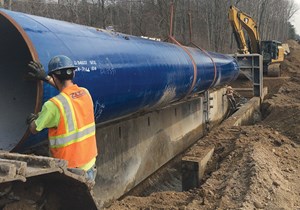Judge sets Aug. 1 as deadline for Flint’s lead pipe project
(AP) — A judge has ordered Flint, Michigan, to replace any remaining lead or steel water lines by Aug. 1, the latest intervention after a series of missed deadlines.
U.S. District Judge David Lawson signed off on an agreement between the city and the Natural Resources Defense Council, which represents residents in long-running litigation that began in 2016.
For 18 months, until fall 2015, Flint was pulling water from the Flint River without treating it to prevent corrosion inside old pipes. Lead contaminated the system as a result.
More than 10,000 pipes have been replaced, though at least 1,000 addresses still haven’t been inspected, according to the NRDC.
Separately, residents have complained about sidewalks that haven’t been repaired after excavations and yards that look bad.
“I have attempted to plant grass in the area the city dug up. This hasn’t worked, and my front lawn looks like it has a bald spot,” Sidney Hemphill told the judge.
Flint has until May 1 to determine which yards need repairs, Lawson said Friday.
The city said it has checked water lines at more than 95% of the thousands of targeted addresses. It cited the COVID-19 pandemic and a shortage of copper pipe and other materials as reasons for any lag.
“The city has not been ‘sitting back and doing nothing,’” attorney Joseph Kuptz said in a court filing. “The opposite is true. The city has been actively, intentionally and diligently moving forward with the task at hand.”
Nearly $100 million for the project came from state and federal governments. Flint returned to a Detroit-area water supplier in fall 2015.
Related News
From Archive

- Glenfarne Alaska LNG targets late-2026 construction start for 807-mile pipeline project
- U.S. water reuse boom to fuel $47 billion in infrastructure spending through 2035
- $2.3 billion approved to construct 236-mile Texas-to-Gulf gas pipeline
- Major water pipe break in Puerto Rico hits over 165,000 customers
- Potomac River Tunnel project enters construction phase beneath Washington, D.C.
- Pennsylvania American Water launches interactive map to identify, replace lead water service lines
- Trump's tariffs drive $33 million cost increase for Cincinnati sewer project
- Utah city launches historic $70 million tunnel project using box jacking under active rail line
- Tulsa residents warned after sewer lines damaged by boring work
- Fatal trench collapse halts sewer construction in Massachusetts; two workers hospitalized




Comments